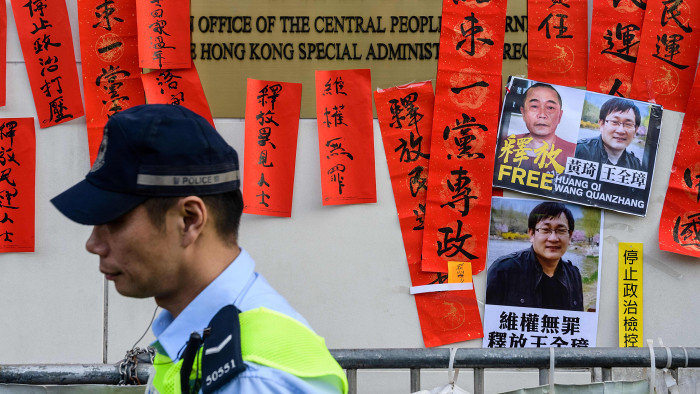Hong Kong: business must pay heed to the erosion of freedoms


Simply sign up to the Professional services myFT Digest -- delivered directly to your inbox.
The popular myth about boiling a frog — that the animal will jump out of the pot if placed in boiling water but die when plonked in cold water and gradually cooked — should be recalled by anyone involved in politics, business or the law in Asia today. In most cases, freedom and the rule of law are being eroded only gradually, but the erosion is real and the cumulative effect substantial.
Business is not exempt from this lesson. In Hong Kong and other financial centres, a surprising number of investors and entrepreneurs believe themselves protected from the depredations of authoritarian governments — and their arbitrary, extralegal decisions — on the grounds that they are purely economic players and steer clear of that terribly disruptive and inconvenient thing called “politics”. They may be right for the time being. In the long run, they are deceiving themselves.
The dangers are, of course, more immediate in authoritarian states such as China. Many observers thought President Xi Jinping would accelerate political and economic reforms and preside over a more liberal society, but he has done the opposite, concentrating power in himself and the ruling Communist party and crushing dissenters.
Lawyers have been arrested simply for doing their job and representing their clients. In January, a Chinese court sentenced human rights lawyer Wang Quanzhang to four-and-a-half years in prison for “subverting state power”. He was only the latest among dozens of lawyers and legal staff to be persecuted.
Journalists, too, are routinely jailed, again for doing their job. According to Reporters Without Borders, which advocates press freedom, no fewer than 44 workers and labour rights defenders are believed to have been detained over just one dispute, that of the Jasic Technology factory in Shenzhen, where employees tried to form a trade union.
In Hong Kong, a semi-autonomous territory of China that is not a democracy but enjoys certain freedoms and an independent legal system inherited from the British, the situation has steadily deteriorated.
My own case last year was by no means the most serious sign of erosion of the rule of law. I was denied a renewal of my work visa and then refused entry to Hong Kong because I hosted a meeting at the Foreign Correspondents’ Club, addressed by Andy Chan, a young local politician who espouses independence for Hong Kong and whose party was later banned. This happened even though the meeting was legal under the guarantees of free speech and freedom of association in Hong Kong’s Basic Law.
More serious have been decisions to deny elected representatives (those who favour real democracy) their right to sit in the Hong Kong legislature, and the use of archaic colonial laws to try to criminalise views or actions that irritate Chinese leaders or their appointees in Hong Kong.
Nine peaceful democracy campaigners, including law professor Benny Tai, were found guilty last month of charges linked to “public nuisance”, including “conspiracy to commit public nuisance”, “incitement to commit public nuisance” and the curious “incitement to incite public nuisance”. Four were sentenced to jail terms of up to 16 months.
Benedict Rogers, human rights activist and chairman of UK-based non-governmental organisation Hong Kong Watch, said the convictions were “part of the Chinese regime’s campaign of ‘lawfare’ against the pro-democracy movement”. Carrie Lam, Hong Kong’s chief executive, called such criticisms “totally unsubstantiated” and said they would harm the city’s reputation “in terms of our rule of law and the independence of the judiciary”.
Then there is Hong Kong’s proposed amendment to its extradition law, a measure that would consign purported criminals to mainland China’s opaque and arbitrary system of justice, including torture and detention without trial. Not surprisingly, business leaders, lawyers and journalists, as well as human rights groups, have criticised the plan, with two US lawmakers, James McGovern and Marco Rubio, declaring that it would “erode Hong Kong’s reputation as a centre of commerce governed by the rule of law”.
Hong Kong’s reputation, however, is already tarnished by its lame response to the abduction of booksellers and other abuses of its constitutional autonomy by Beijing since the handover from the UK in 1997. There was a deafening silence from the authorities when billionaire Xiao Jianhua was kidnapped by mainland security agents more than two years ago from the Four Seasons hotel in Hong Kong. He has not been seen since.
On the mainland, meanwhile, two Canadians — a businessman and an ex-diplomat — have been detained in a transparent attempt to put pressure on Ottawa to release Meng Wanzhou, chief financial officer of Chinese telecoms group Huawei, who is being held in Canada in response to a US extradition request.
The reality is that abuses of freedom, transparency and the rule of law can never be fully confined to the “political” sphere.
There is not merely the problem of business people, lawyers and journalists trying to go about their daily business without risking arbitrary arrest. Economic and financial news and data, essential for bankers and industrialists, are an increasingly contested area. This is true even in a democracy such as India, but it is particularly so in authoritarian China.
As the Chinese economy slowed last year, propaganda officials ordered editors and journalists to refrain from publishing bad news about such matters as inefficient state companies and local government debt. “The economy is now political,” one editor told the FT anonymously at the time.
In too many countries — from Turkey to China, and even the US — respect for the truth and rule of law is now under sustained attack. That is why work by law firms to improve protection for journalists, whistleblowers and activists is so important — even if it turns out not to be enough.
The assault is not always alarming or visible, because our freedoms are usually eroded one small step at a time. But the frog is slowly being boiled, and soon it may be too late to jump out of the pot.
The writer is the FT Paris bureau chief, and was previously Asia editor and Asia news editor.
The table below ranks law firms and in-house legal teams for the FT Innovative Lawyers Apac awards.
Rule of Law and Access to Justice:
Explore the Innovative Lawyers Asia-Pacific rankings 2019

Overall
- FT Most Innovative Law Firms
- Rule of Law and Access to Justice
- Most Innovative In-house legal teams
- Collaboration
Business of Law
- Data, Knowledge and Intelligence
- Managing and Developing Talent
- Innovation in Diversity and Inclusion
- New Business and Service Delivery Models
- New Products and Services
- Strategy and Changing Behaviours
- Technology
Legal Expertise
- Accessing New Markets and Capital
- Enabling Business Growth and Transformation
- Managing Complexity and Scale
- Litigation and Disputes
- Creating a New Standard
Comments